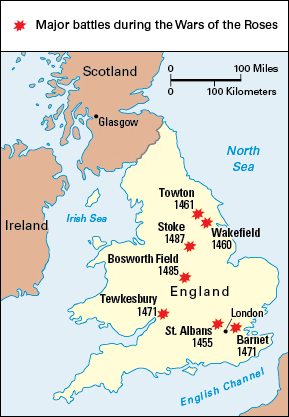Wars of the Roses were a series of civil wars in England in the 1400’s. Two branches of the royal Plantagenet family fought for the English throne. Each side had a rose as its symbol. The House of York had long used a white rose as its emblem. The House of Lancaster became identified with a red rose.

A number of factors helped lead to the wars—disputes between the two houses, the defeat of English forces in France, the weakness and corruption of England’s government, and the existence of powerful, warlike nobles. The wars began in 1455 with the Battle of St. Albans, near London.
At that time, King Henry VI of the House of Lancaster held the throne. His grandfather Henry IV had seized power in 1399. Richard, Duke of York, claimed that Henry VI had no right to be king. Richard was killed at the Battle of Wakefield in 1460. But in 1461, his oldest son was proclaimed King Edward IV. Soon after being proclaimed king, Edward crushed the Lancastrians at the Battle of Towton, near York.
In 1470, the forces of Lancaster drove Edward from England and brought back Henry VI. Edward returned seven months later, defeated the Lancastrian forces at the battles of Barnet (near London) and Tewkesbury, and regained the throne. The House of York ruled until 1485, when King Richard III was killed in the Battle of Bosworth Field, near Leicester, and Henry Tudor, a kinsman of the House of Lancaster, became King Henry VII. Many historians have considered this battle as the war’s end.
In 1486, Henry married Elizabeth, daughter of Edward IV, uniting the houses of Lancaster and York and founding the Tudor dynasty. Some Yorkists continued to oppose Henry. But a lack of funds on both sides, weariness of war, and firm government soon ended the fighting. One further engagement, the Battle of Stoke, occurred near Newark in 1487. This battle was easily won by Henry VII over Yorkist rebels. Some scholars view it as the true final engagement of the wars.
